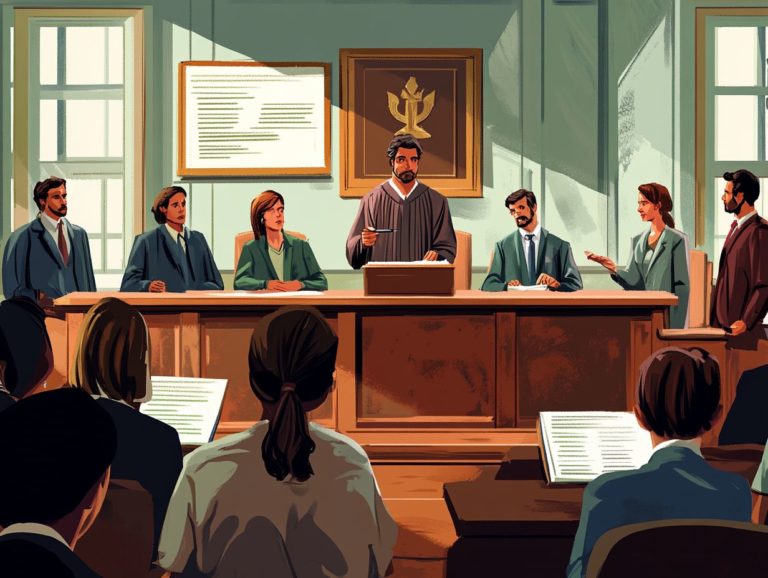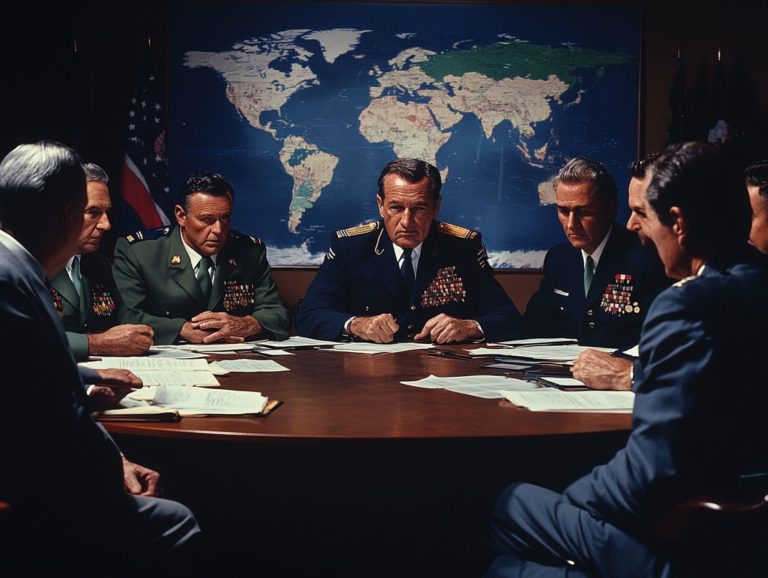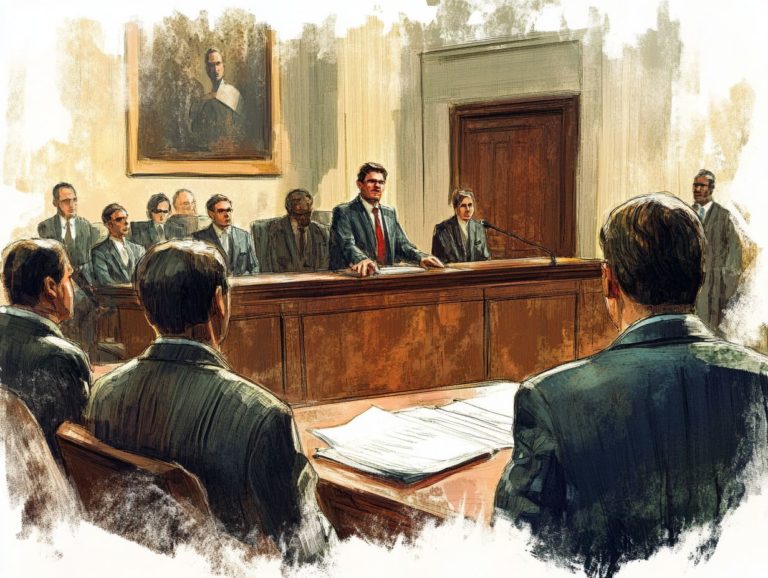The 5 Most Effective Defense Strategies
Navigating the complexities of legal challenges can be daunting, but don t worry! A strong defense strategy can change everything.
This article explores five effective ways to defend yourself during tough times. By calmly assessing your situation, gathering essential evidence, and seeking reliable legal advice, you ll find that each step is crucial in building a solid defense.
It highlights common pitfalls to avoid. A well-crafted strategy can significantly influence the outcome of your case. Stay informed and well-equipped as you explore these essential tactics.
Contents
- Key Takeaways:
- 1. Stay Calm and Assess the Situation
- 2. Communicate Clearly and Effectively
- 3. Gather Evidence and Witnesses
- 4. Seek Legal Advice and Representation
- 5. Be Prepared for All Possible Outcomes
- What Are the Different Types of Defense Strategies?
- How Can One Determine the Most Effective Defense Strategy for Their Case?
- What Are the Common Mistakes to Avoid in a Defense Strategy?
- How Can a Strong Defense Strategy Impact the Outcome of a Game?
- What Are the Key Elements of a Successful Defense Strategy?
- How Can One Stay Informed and Up-to-Date on Defense Strategies?
- Frequently Asked Questions
- What Are the 5 Most Effective Defense Strategies?
- How Can Situational Awareness Help in Self-Defense?
- What Is Avoidance and How Does It Work as a Defense Strategy?
- Can De-escalation Be Used as a Defense Strategy?
- Are Physical Self-Defense Techniques Necessary for Effective Defense?
- When Should I Seek Help from Others as a Defense Strategy?
Key Takeaways:
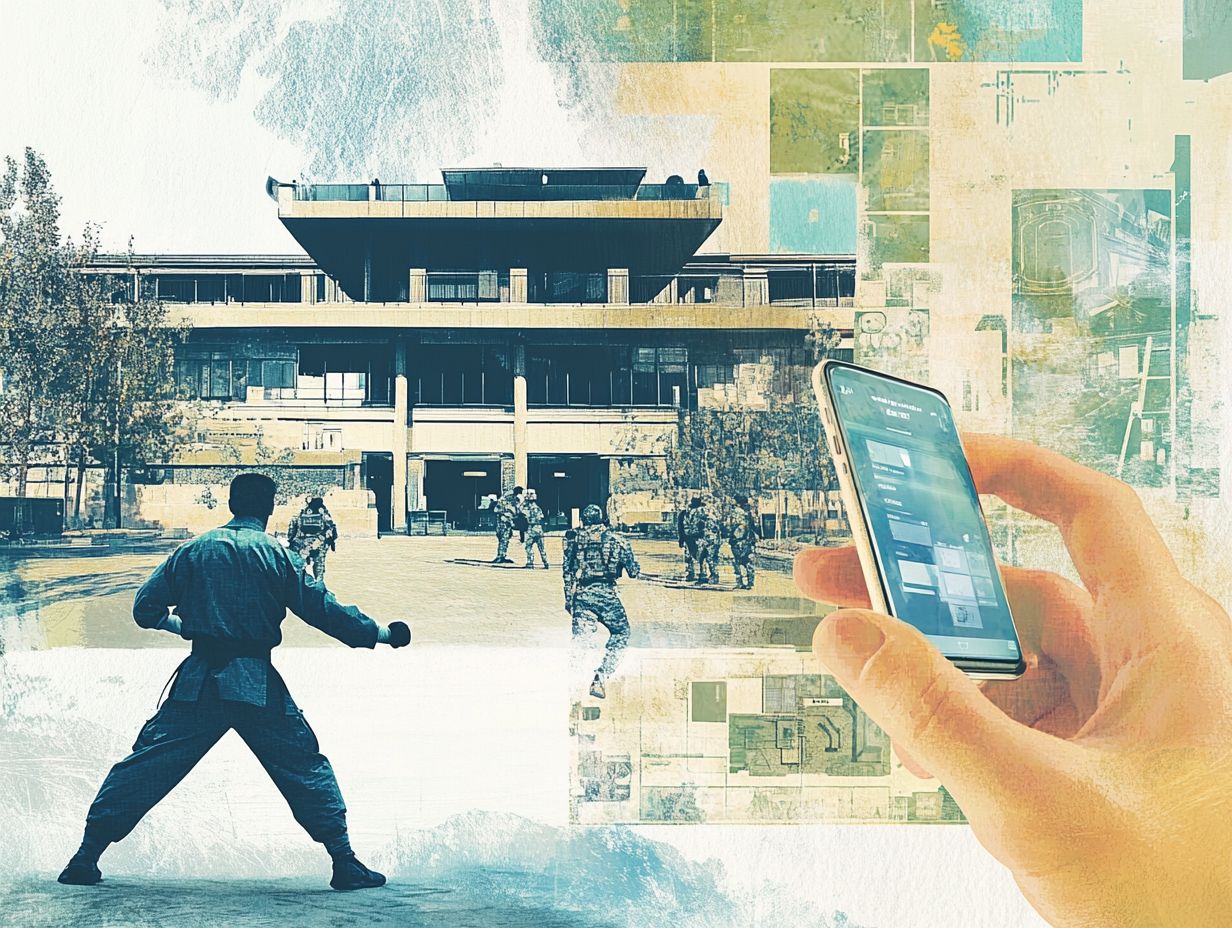
Stay calm and assess the situation before choosing a defense strategy.
Effective communication is key in any defense strategy.
Gather evidence and players to back your defense.
1. Stay Calm and Assess the Situation
In competitive basketball, it s vital to stay calm and assess the situation. Think of players like Matisse Thybulle and Zach LaVine, who expertly use different ways to defend, like man-to-man defense (guarding a specific player) and zone defense (covering an area of the court).
Keeping your composure lets you make crucial decisions, whether you re in a high-stakes game like the NBA Championship or a summer tournament like the Red Bull Pro-Am Basketball Classic.
This emotional regulation doesn t just boost your performance; it can be the difference between victory and defeat for your team.
Take LeBron James during the 2016 NBA Finals his remarkable calm in Game 7 was key as he smoothly transitioned from defense to offense, leading his team to victory.
Similarly, Chris Paul consistently shows this skill by calmly orchestrating plays even under intense pressure. This ability allows him to outsmart defenders and create scoring opportunities.
By effectively assessing opponents’ movements and gauging time and score, you can position yourself strategically. A perfect example occurred during the 2020 playoffs when teams made decisive defensive adjustments by anticipating offensive plays.
Such awareness and emotional control are essential for not just your success, but also for building team synergy and resilience.
2. Communicate Clearly and Effectively
Clear and effective communication is essential in basketball, especially when coordinating ways to defend among players like Donte DiVincenzo and Matisse Thybulle. They often need to call plays and make adjustments quickly during games.
In those high-pressure moments, vocal communication becomes very important. As teams implement defensive formations like the 2-3 zone or box-and-one, it s crucial for everyone to work in harmony.
For example, a team that excels in these strategies will rely heavily on vocal cues to signal shifts, creating a cohesive defensive unit. Just look at the success of teams like the Milwaukee Bucks and the Philadelphia 76ers; their effective communication leads to impressive defensive steals and reduces turnovers.
By prioritizing communication on the court, you enhance your own performance and elevate your team’s defensive effectiveness.
3. Gather Evidence and Witnesses
In basketball, gathering evidence and witnesses means carefully analyzing game footage and statistics. This investigation offers valuable insights into the defensive techniques used by players like Zach LaVine and the Milwaukee Bucks during critical games.
Look closely at player performance metrics. Analyzing these can reveal patterns that boost your game plans. For example, understanding how a player’s shooting accuracy changes under pressure can help create tailored training programs that refine individual skills.
Additionally, examining past matchups can uncover insights into an opponent’s weaknesses, allowing you to adjust strategies more effectively.
This comprehensive approach fosters a richer understanding of the game, ultimately enhancing team synergy and improving your chances of success in future competitions.
4. Seek Legal Advice and Representation

Seeking legal advice and representation in basketball is like needing a game plan on the court. Players must understand the rules and regulations that govern competitive events to optimize their defensive tactics.
Just as a full-court press requires a deep understanding of defensive play to apply pressure effectively, knowing legal frameworks helps athletes navigate their professional landscape better.
With the triangle and two defense, players adjust their strategies based on their opponents’ unique strengths and weaknesses. Similarly, individuals benefit from tailored legal representation that addresses their specific situations.
Having knowledgeable agents or attorneys ensures that players stay informed about league regulations and contract stipulations, much like knowing when to switch defensive formations during the game’s dynamics.
5. Be Prepared for All Possible Outcomes
Being prepared for every possible outcome is essential in basketball. You need to anticipate various game scenarios, whether you’re fending off a full-court press or dealing with unexpected turnovers during high-stakes moments.
This adaptability goes beyond individual talent; it demands a deep understanding of team dynamics and the game’s ever-changing nature.
For example, a team may start with a traditional man-to-man defense but quickly transition to a diamond-and-one setup to counteract a star player dominating the scoreboard.
Legendary teams like the 1995-96 Chicago Bulls exemplified this strategic flexibility, often altering their defensive schemes mid-game to outsmart their opponents.
Today, similar skills are evident in players like Draymond Green, who excels at reading the game and adjusting his defense on the fly. This adaptability is key to thriving in the fast-paced world of basketball!
What Are the Different Types of Defense Strategies?
Basketball offers a fascinating array of defensive strategies, each designed to enhance your gameplay. You can choose from man-to-man coverage, various zone defenses like the 2-3 zone and match-up zone, or specialized formations such as box & one and triangle & two.
Each strategy has unique applications and effectiveness based on game dynamics and opponent strengths. Understanding common defense strategies can dictate the rhythm of the game and require teammates to adapt to offensive maneuvers and rivals’ skill sets.
Take man-to-man defense, for instance it places the responsibility on individual players, allowing someone like Matisse Thybulle to showcase his speed in neutralizing primary scorers. In contrast, the 2-3 zone strengthens your interior defense against driving opponents, giving players like Donte DiVincenzo an excellent opportunity to interrupt passing lanes and launch fast breaks.
Understanding the strengths and weaknesses of each defensive strategy in specific scenarios is essential for both coaches and players. This knowledge enables you to outsmart opponents and gain the upper hand on the court.
How Can One Determine the Most Effective Defense Strategy for Their Case?
Determining the most effective defense strategy in basketball requires closely analyzing the opposing team’s strengths and understanding your players’ skills. You must adapt your approach accordingly, whether implementing a half-court press or using a combination defense.
To achieve this, you often refer to comprehensive scouting reports and meticulous game film analysis, which provide invaluable insights into opponents’ tendencies and play styles.
For example, the Milwaukee Bucks demonstrate a remarkable ability to adjust their defensive schemes based on each matchup’s unique conditions. If they notice that an opponent relies heavily on outside shooting, they prioritize perimeter defense to disrupt those attempts.
Conversely, when facing a team excelling in the paint, they may pivot to a more zone-oriented strategy, effectively clogging driving lanes and forcing less favorable shots.
This flexibility highlights the significance of strategic foresight and quick decision-making in the game.
What Are the Common Mistakes to Avoid in a Defense Strategy?

Common mistakes in defensive strategies can lead to unnecessary turnovers and missed opportunities. For instance, failing to communicate effectively during a zone defense or neglecting to guard against fast breaks can spell disaster.
To elevate your performance, stay vigilant about positioning. A balanced stance allows you to anticipate your opponent’s movements instead of overcommitting to one side.
High-stakes matches show the risks of underestimating opponents. A team that underestimates their rival often finds themselves caught off guard, leading to easy baskets.
Consider that playoff game where a renowned player mishandled a quick transition, giving the opponents a perfect chance to exploit a defensive lapse.
By fostering open dialogue and quick decision-making, you can significantly enhance your defensive effectiveness, turning potential threats into valuable scoring opportunities.
How Can a Strong Defense Strategy Impact the Outcome of a Game?
A strong defensive strategy in basketball can significantly shape the outcome of a game. Teams that execute effective full-court presses or well-coordinated zone defenses often secure crucial steals and minimize turnovers.
These defensive tactics limit the opposition’s scoring opportunities and create fast-break chances, allowing you to capitalize on your opponent’s mistakes.
Take the 2004 Detroit Pistons, for example. Their strong defense was instrumental in securing an NBA championship, underscoring how essential defensive prowess can be a game changer.
Statistics support this notion, revealing that teams with top-ranked defensive ratings frequently outperform their less-defensive-minded counterparts, highlighting a clear correlation between robust defensive strategies and victory in crucial matchups.
What Are the Key Elements of a Successful Defense Strategy?
Key elements of a successful basketball defense strategy include effective communication, optimal player positioning, adaptability, and a keen understanding of opponent tactics. Together, these aspects significantly enhance the defensive prowess of teams like the Milwaukee Bucks.
These elements strengthen your team’s ability to contain opponents and foster a seamless synergy where players anticipate each other’s movements. Effective communication keeps defenders informed about screens, switches, and potential drives, enabling quick reactions to minimize scoring opportunities.
Player positioning is paramount; for instance, Matisse Thybulle exemplifies this by consistently finding the right angles to cut off opposing players and disrupt their rhythm. Adaptability allows your defense to tweak strategies based on the opponent’s strengths, while a thorough understanding of their tactics facilitates preemptive maneuvers.
Take a page from teams like the Miami Heat, who expertly rotate players to maintain pressure and ensure unyielding defensive coverage.
How Can One Stay Informed and Up-to-Date on Defense Strategies?
To stay informed about defense strategies in basketball, tap into a wealth of resources. Professional analysis, game footage, and social media updates from stars like Zach LaVine are invaluable.
Participating in training camps, such as the Red Bull 3X, can further enhance your skills. Online platforms like YouTube offer a treasure trove of tutorials and breakdowns of defensive plays, allowing you to learn from experts and analyze various game scenarios.
Websites dedicated to sports analytics provide insights into the statistics behind defensive performance, helping you understand your strengths and identify areas for improvement. Engaging in forums or social media groups fosters knowledge sharing, where you can discuss evolving tactics and new defensive techniques.
In the ever-changing landscape of basketball, continuous education is vital to stay ahead of the game; staying alert to the latest strategies sharpens your skills and prepares you to adapt to the fast-paced nature of the game.
Frequently Asked Questions
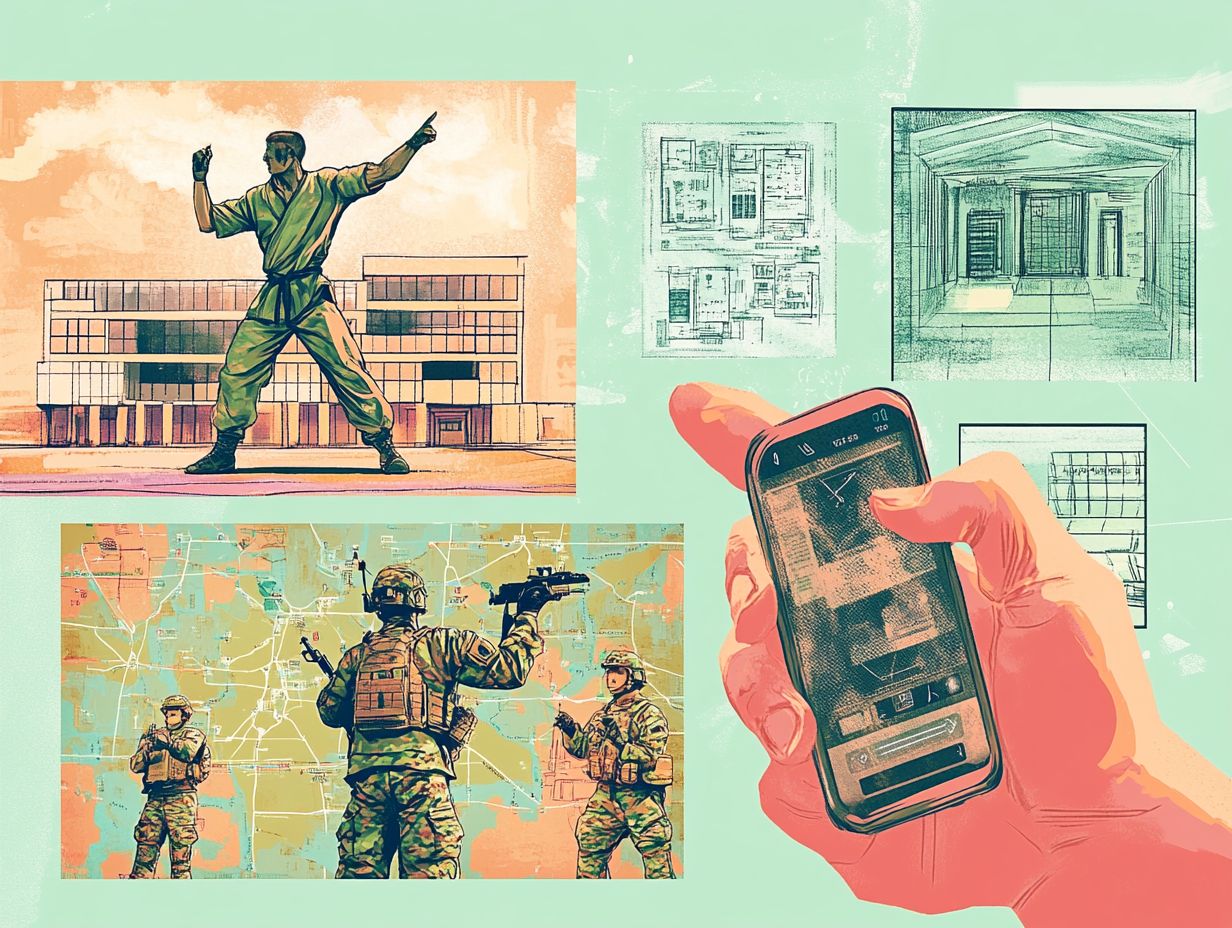
What Are the 5 Most Effective Defense Strategies?
The 5 most effective defense strategies are:
- Situational awareness
- Avoidance
- De-escalation
- Physical self-defense techniques
- Seeking help from others
How Can Situational Awareness Help in Self-Defense?
Situational awareness means being alert to your surroundings and spotting potential threats. It helps you avoid dangerous situations by keeping you informed.
What Is Avoidance and How Does It Work as a Defense Strategy?
Avoidance is about steering clear of danger. This includes not going to certain areas or avoiding people who may threaten your safety.
Can De-escalation Be Used as a Defense Strategy?
Yes! De-escalation uses communication to calm down potentially violent situations. This helps prevent fights and keeps everyone safe.
Are Physical Self-Defense Techniques Necessary for Effective Defense?
Not everyone needs physical self-defense skills, but they are useful in some scenarios. Learn these techniques from a qualified instructor and use them only as a last resort.
When Should I Seek Help from Others as a Defense Strategy?
If you feel threatened, seek help immediately. Call the police, ask bystanders for assistance, or find a safe place. It’s always better to ask for help than to face danger alone.


